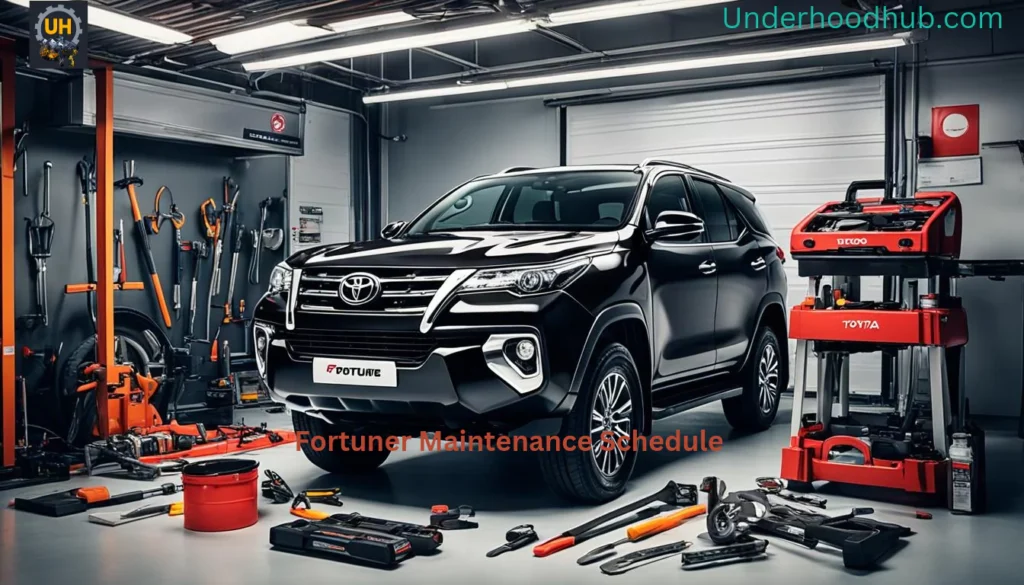Did you know that 95% of Toyota Fortuner owners who follow the recommended maintenance schedule report fewer breakdowns and longer vehicle lifespans? This shows how important it is to take good care of your SUV. It helps your vehicle perform better and last longer.

The Toyota Fortuner maintenance schedule is more than just a set of rules. It’s a guide to keep your strong SUV running smoothly on the roads. By sticking to the Toyota SUV service schedule, you’re taking care of your vehicle and saving money in the long run.
You can also check out other maintenance or scroll through other guide.
This guide will cover Toyota’s recommended maintenance tips, including service intervals and routine checks. We’ll also share expert advice for driving conditions. Whether driving in the city or on a long trip, knowing what your Fortuner needs is crucial for its best performance.
Understanding Your Toyota Fortuner’s Service Needs
Keeping your Toyota Fortuner in top shape is essential. It’s key to its longevity and performance. Let’s look at the basics of Toyota Fortuner maintenance:
Importance of Regular Maintenance
Regular maintenance is vital for your Fortuner. It stops breakdowns, boosts fuel efficiency, and keeps its value high. Following the maintenance guide in the fortuner owner’s manual can save you from expensive repairs later.
Decoding the Toyota Service Manual
The Toyota preventive maintenance guide is essential for your Fortuner. It shows service times, what to do, and which parts to check often. Knowing this manual helps you keep up with your vehicle’s needs.
Factory vs. Real-World Maintenance Requirements
Factory advice is a good start, but real-world driving changes things. Climate, driving habits, and road conditions affect your Fortuner’s maintenance needs. Here’s a look at the differences:
| Maintenance Item | Factory Recommendation | Real-World Consideration |
|---|---|---|
| Oil Change | Every 10,000 km | Every 5,000-7,500 km in harsh conditions |
| Air Filter | Every 40,000 km | Every 20,000-30,000 km in dusty areas |
| Brake Fluid | Every 40,000 km | Every 30,000 km for frequent hill driving |
By mixing factory advice with real-world needs, you’ll keep your Toyota Fortuner running well and lasting longer.
Toyota Fortuner Maintenance Schedule: Mileage-Based Intervals
Looking after your Toyota Fortuner is key to its long life and good performance. The Toyota Fortuner maintenance plan lists services at set mileage points. This guide keeps you ahead of your car’s needs and helps with budgeting for maintenance.
Here are the main mileage points and what services you should do at each:
| Mileage | Services Required |
|---|---|
| 5,000 km | Oil change, tire rotation, brake inspection |
| 10,000 km | Air filter replacement, fluid level check |
| 20,000 km | Transmission fluid change, spark plug inspection |
| 40,000 km | Fuel filter replacement, drive belt inspection |
| 60,000 km | Coolant replacement, valve clearance check |
Your Fortuner service manual gives detailed info on these intervals and tasks. Remember, your car’s maintenance needs can change based on your use. For example, if you often go off-roading or drive in dusty places, you might need to service your car more often.
Regular maintenance keeps your Fortuner running well and saves you from expensive repairs later. By sticking to this mileage schedule, you’re looking after your car’s future. This means safer, more dependable driving for you.
Essential Routine Services for Your Fortuner
Keeping your Toyota Fortuner in top shape means regular maintenance. Look at the key services that keep your SUV running smoothly for years:
Oil Changes and Filter Replacements
Changing your oil is key for your engine’s health. Toyota suggests changing oil every 5,000 miles or every six months, whichever is first. This can change based on how you drive. Always pick high-quality oil and filters to shield your engine.
Tire Rotations and Alignments
Rotating your tires correctly can make them last longer and drive better. Do this every 5,000 to 8,000 miles. Also, align your wheels once a year or when you see uneven wear.
Brake System Inspections
Check your brakes every 10,000 miles or once a year. Look at brake pads, rotors, and fluid levels. Replace parts as needed to keep your car stopping well.
Battery and Electrical System Checks
Look at your battery and electrical system every year. Clean the terminals, check connections, and test the alternator. A well-kept electrical system stops sudden breakdowns.
| Service | Frequency | Importance |
|---|---|---|
| Oil Change | Every 5,000 miles | Vital for engine longevity |
| Tire Rotation | Every 5,000-8,000 miles | Ensures even tire wear |
| Brake Inspection | Every 10,000 miles | Critical for safety |
| Battery Check | Annually | Prevents electrical issues |
Major Service Milestones for the Toyota Fortuner
The Toyota Fortuner needs more detailed maintenance as it hits certain mileage marks. These services keep your car running well for a long time. Let’s look at the key service times and what they cover.
At 60,000 kilometers, your Fortuner needs its first big service. This includes:
- Transmission fluid change
- Spark plug replacement
- Air and fuel filter replacements
- Brake fluid flush
When your Fortuner hits 100,000 kilometers, it’s time for another important service. This service includes:
- Timing belt replacement
- Water pump inspection and possible replacement
- Coolant system flush
- Differential fluid change
At 150,000 kilometers, your Fortuner needs checks on its suspension and drivetrain. This service often covers:
- Shock absorber inspection and potential replacement
- CV joint and boot check
- Transfer case fluid change (for 4WD models)
- Comprehensive engine and transmission inspection
Remember, these are general guidelines. Your Fortuner’s specific needs may vary based on how you drive and use it. Always check your owner’s manual or talk to a certified Toyota expert for advice on major service times.
Preventive Maintenance: Avoiding Common Fortuner Issues
Keeping your Toyota Fortuner in top shape means taking care of it early. By fixing problems before they start, you can save money and enjoy a better ride. Here are some tips to help you avoid common issues with your Fortuner.
Engine and Transmission Care
Regular oil changes are key for your Fortuner’s engine. Use high-quality oil and change it every 5,000 to 7,500 miles. Also, check the transmission fluid monthly and replace it as needed. These steps can help avoid many engine and transmission problems.

Suspension and Steering Maintenance
Check your Fortuner’s suspension parts often. Look for any wear on shock absorbers, struts, and bushings. Rotate your tires every 5,000 miles and keep them properly aligned. This helps prevent uneven tire wear and steering problems.
Cooling System Maintenance
Not taking care of the cooling system can lead to overheating. Flush and replace coolant every 30,000 miles or two years. Inspect hoses and belts for damage. Keeping the radiator clean also helps prevent engine damage and makes your Fortuner last longer.
| Maintenance Task | Frequency | Benefits |
|---|---|---|
| Oil Change | Every 5,000-7,500 miles | Protects engine, improves fuel efficiency |
| Tire Rotation | Every 5,000 miles | Ensures even wear, extends tire life |
| Coolant Flush | Every 30,000 miles or 2 years | Prevents overheating, protects engine components |
DIY Maintenance vs. Dealer Services: What You Can Do Yourself
Maintaining your Toyota Fortuner can be a mix of doing it yourself and getting professional help. Some tasks are easy enough for owners to do on their own. Others are best left to the experts. Let’s look at what you can do at home and what’s better left to the pros.
- Checking and topping up fluids
- Replacing air filters
- Changing windshield wipers
- Inspecting tire pressure and tread
- Battery maintenance
These tips can save you time and money. Regular checks help spot problems early. This can prevent expensive repairs later.
For complex jobs, it’s wise to use professional services. These include:
- Engine diagnostics and repairs
- Transmission Service
- Brake system overhauls
- Suspension work
Dealers have the right tools and trained staff for these tasks. They use genuine Toyota parts. This ensures your Fortuner stays reliable and performs well.
Even if you’re good with tools, always check your owner’s manual before maintenance. This guide will help you find the right balance between doing it yourself and getting professional help for your Toyota Fortuner.
Toyota Fortuner Maintenance Costs: Budgeting for Care
Owning a Toyota Fortuner means you have to think about the costs. Knowing the monthly and yearly maintenance costs helps you plan your budget. Let’s look at the expenses and what affects them.
Monthly and Annual Maintenance Expenses
The cost to maintain your Fortuner each month depends on how much you drive and the conditions you drive in. On average, you might spend ₹1,500 to ₹3,000 a month for regular maintenance. This adds up to about ₹18,000 to ₹36,000 a year.
| Maintenance Item | Monthly Cost (₹) | Annual Cost (₹) |
|---|---|---|
| Oil Changes | 500-800 | 6,000-9,600 |
| Tire Rotations | 200-300 | 2,400-3,600 |
| Fluid Top-ups | 300-500 | 3,600-6,000 |
| Miscellaneous | 500-1,400 | 6,000-16,800 |
Long-Term Service Costs
After five years, the cost of maintaining your Fortuner goes up because of wear and tear. Big services like replacing the timing belt or the transmission can really hit your wallet. You might spend ₹50,000 to ₹1,00,000 on these big maintenance tasks.
Factors Affecting Maintenance Expenses
Several things can change how much you spend on maintaining your Fortuner:
- Driving habits and conditions
- Following a regular maintenance schedule
- The quality of parts you use
- Choosing between authorized service centers and local garages
Knowing these can help you make better choices to keep your Toyota Fortuner’s maintenance costs in check.
Extending Your Fortuner’s Lifespan: Maintenance Tips and Tricks
To keep your Toyota Fortuner running well for years, do more than follow the basic maintenance plan. Smart driving habits are key to keeping your SUV in top shape. Avoid harsh acceleration and braking to protect the engine and brakes.
Proper storage is crucial for your Fortuner’s maintenance. If you can, park your car under cover to shield it from bad weather. If you must park outside, use a good car cover to protect it from the sun and pollution.
Cleaning your Fortuner is more than just making it look good. It’s a must-do for maintenance. Wash your car often to remove dirt that can harm the paint and chassis. Remember to clean the inside, too, as this keeps the materials in good condition and helps your SUV’s value.
Listen to your Fortuner if it makes strange noises or doesn’t perform right. Fixing minor problems early can save you from big, expensive repairs later. By following these tips with regular maintenance, your Toyota Fortuner will stay strong for many years.
What is the recommended maintenance schedule for the Toyota Fortuner?
Toyota has a detailed maintenance plan for the Fortuner in the owner’s manual. It lists service times by mileage. This includes oil changes, tire rotations, brake checks, and major services.
How often should I change the oil in my Toyota Fortuner?
You should change the oil in your Fortuner every 5,000 miles or every 6 months, whichever comes first. Always check your owner’s manual for the best advice based on how you drive.
When should I rotate the tires on my Fortuner?
Rotate your Fortuner’s tires every 5,000 miles or when you change the oil. This keeps the tires wearing evenly and makes them last longer.
What are the major service milestones for the Toyota Fortuner?
Key service points for the Fortuner include replacing the timing belt at about 90,000 miles, transmission service, coolant flush, and brake fluid change.






